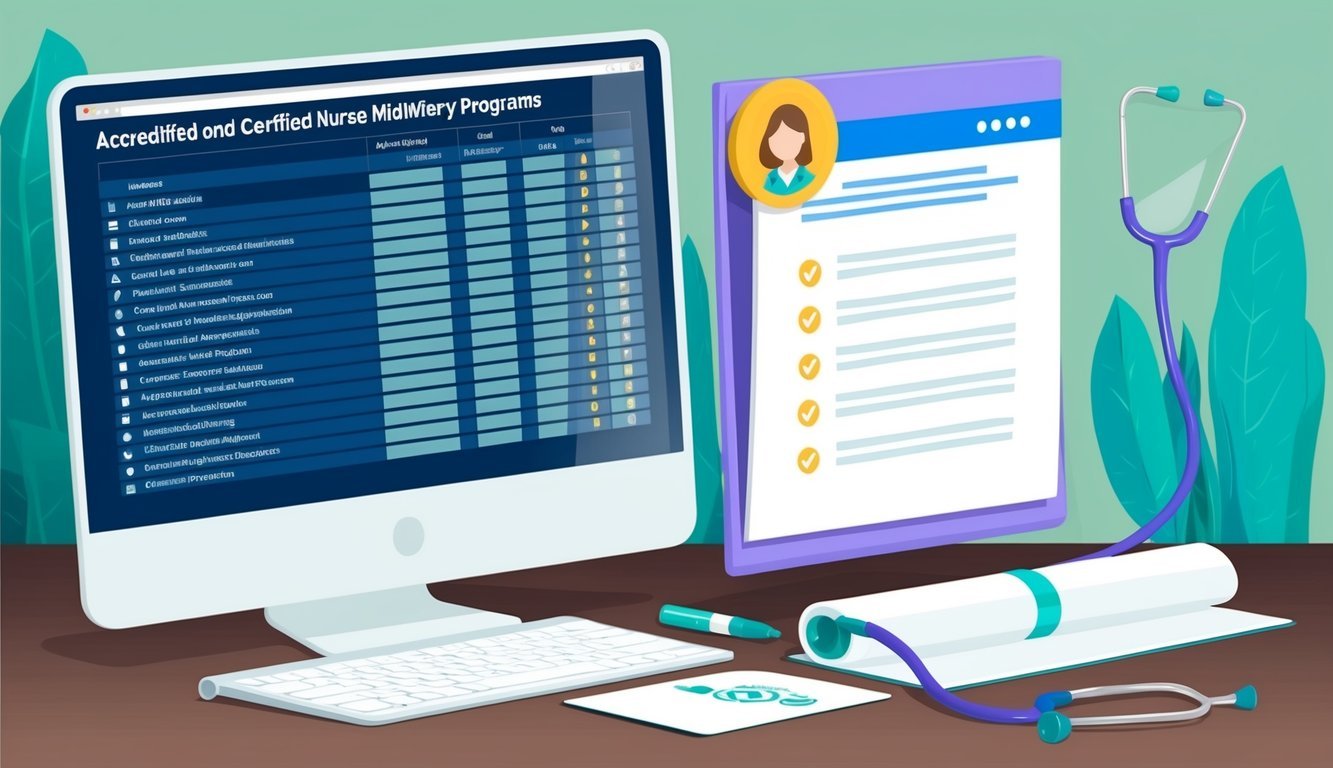Embarking on a career as a nurse-midwife can be an incredibly rewarding path for those passionate about women’s health. Online nurse midwifery programs offer flexibility, allowing you to balance your studies with personal and professional commitments. These programs are designed for registered nurses seeking to expand their expertise and become certified nurse-midwives.
Certified nurse-midwives provide comprehensive care during pregnancy, childbirth, and postpartum.
Choosing an accredited online program can significantly enhance your educational journey, ensuring you receive quality training from respected institutions.
Many of these programs, such as those offered by the University of Cincinnati and Baylor University, equip you with essential skills while accommodating your busy schedule.
As a certified nurse-midwife, you will not only improve health outcomes but also build lasting relationships with families throughout their pregnancy experience.
The demand for certified nurse-midwives continues to rise, presenting numerous opportunities in the healthcare field.
By pursuing an online nurse midwifery program, you set yourself up for a fulfilling career that supports women’s health and well-being in a dynamic work environment.
Explore the variety of options available and take the first step toward this impactful profession.
Educational Pathways

There are several educational pathways you can take to become a certified nurse midwife (CNM).
Each level of education will prepare you for different responsibilities in the field and can significantly influence your career trajectory.
Bachelor of Science in Nursing (BSN)
A Bachelor of Science in Nursing (BSN) is your foundational degree for a nursing career.
This program typically requires four years of study and prepares you for the NCLEX-RN licensing exam.
In a BSN program, you will learn essential skills such as:
- Patient care techniques
- Nursing ethics
- Communication skills
- Health assessment
Many colleges and universities offer accredited BSN programs, which is crucial for furthering your education.
You can find online options that allow for a flexible schedule.
Graduating from an accredited program also enhances your employability and prepares you for advanced degrees.
Master of Science in Nursing (MSN)
After earning your BSN, you can pursue a Master of Science in Nursing (MSN).
This degree typically takes two years to complete.
The MSN program focuses on advanced clinical skills and knowledge essential for specialized roles, including nurse midwifery.
Key aspects of the MSN program include:
- Advanced practice nursing
- Leadership in healthcare
- Evidence-based practice
- Clinical management
You will also participate in clinical practicum experiences, which provide hands-on training in real-world settings.
Look for MSN programs accredited by the Accreditation Commission for Midwifery Education (ACME) to ensure quality education.
Doctor of Nursing Practice (DNP)
For those aiming for the highest level of clinical practice, the Doctor of Nursing Practice (DNP) is an excellent choice.
This terminal degree typically requires 1-2 years beyond the MSN.
DNP programs emphasize advanced practice and leadership roles in nursing.
In a DNP program, you will focus on:
- Healthcare policy
- Quality improvement
- Advanced clinical practice
- Research methodologies
These programs often include a scholarly project that addresses a specific healthcare issue.
Graduating with a DNP can open doors to higher-level positions in academia and leadership roles in healthcare systems.
Make sure your program is accredited to ensure the quality and recognition of your degree.
Accreditation and Certification

Understanding the importance of accreditation and certification is crucial for aspiring nurse-midwives.
These credentials ensure that the education you receive meets specific professional standards, ultimately impacting your eligibility for certification and practice.
Accreditation Commission for Midwifery Education (ACME)
The Accreditation Commission for Midwifery Education (ACME) plays an essential role in establishing quality standards for midwifery programs.
ACME accredits programs that prepare students for a career as Certified Nurse-Midwives (CNMs).
Accreditation by ACME signifies that a program meets rigorous educational standards.
Programs accredited by ACME are recognized for preparing graduates who are competent and ready for clinical practice.
You can find a list of accredited programs on the ACME website, which helps in selecting a program that meets both educational and professional requirements.
Commission on Collegiate Nursing Education (CCNE)
The Commission on Collegiate Nursing Education (CCNE) is another key accrediting body.
It focuses on the accreditation of baccalaureate and graduate nursing education programs.
CCNE ensures that programs offer quality education that prepares you for a diverse range of nursing roles, including midwifery.
CCNE-accredited programs are evaluated on their mission, goals, and educational outcomes.
They emphasize quality improvement and continuous assessment.
Enrollment in a CCNE-accredited program enhances your credibility and job prospects in the healthcare field.
American Midwifery Certification Board (AMCB)
The American Midwifery Certification Board (AMCB) is responsible for certifying nurse-midwives and midwives.
Upon completing an accredited nurse-midwifery program, you must pass the AMCB certification exam to practice as a Certified Nurse-Midwife (CNM).
Certification from AMCB indicates that you possess the necessary knowledge and skills for midwifery practice.
This certification is crucial for ensuring quality care and is often a requirement for employment.
The AMCB also provides continuing education resources, helping you stay current in your field.
For more details, you can visit ACME, CCNE, and AMCB to further explore their standards and accredited programs.
Admission and Program Requirements
Entering an online nurse midwifery program involves meeting specific criteria that ensure readiness for the challenges ahead.
Key elements include admission requirements, clinical experience, and the academic commitment necessary to succeed in your studies.
Admission Criteria
To apply for an online nurse midwifery program, you must hold a valid Registered Nurse (RN) license.
Most institutions require a Bachelor of Science in Nursing (BSN) or a related degree.
You will also need to submit transcripts from all post-secondary institutions attended.
Meeting the minimum cumulative GPA, typically around 3.0, is often essential for consideration.
References from healthcare professionals or professors can strengthen your application by providing insights into your skills and character.
Be prepared to demonstrate your commitment to women’s health through a personal statement.
Clinical Experience and Placement
Clinical hours are a critical component of the nurse midwifery curriculum.
Most programs require around 500–800 hours of supervised clinical practice.
You will be expected to gain experience in various areas, such as prenatal, intrapartum, and postpartum care.
Clinical placement support is usually provided by the institution, helping you secure appropriate settings to fulfill your hour requirements.
It’s beneficial to network within your community to identify potential clinical sites, as some programs may prefer or recommend specific affiliations.
Academic Commitment
Online nurse midwifery programs require significant academic commitment.
Courses typically cover topics like maternal-fetal health, pharmacology, and advanced clinical skills.
You can expect to dedicate 15-20 hours per week to coursework, readings, and assignments.
Time management is crucial, as balancing your studies with clinical practice and personal responsibilities is often challenging.
Engaging with faculty and fellow students can provide support throughout your educational journey.
Be prepared to meet different assessment methods, including exams, practical demonstrations, and written assignments, ensuring you are well-rounded in both knowledge and skills.
Curriculum and Specializations
In online nurse-midwifery programs, the curriculum is designed to equip you with essential knowledge and skills.
It covers core midwifery topics and allows for specialization in women’s health, incorporating various aspects of care.
Core Midwifery Courses
Core courses lay the foundation of your training as a nurse-midwife.
Programs typically include subjects such as:
- Primary Care: Understanding holistic health for women.
- Gynecologic Care: Focus on reproductive health and disorders.
- Antepartum Care: Managing pregnancy before labor.
- Labor and Birth: Skills for facilitating safe deliveries.
- Postpartum Care: Addressing recovery and well-being after birth.
- Newborn Care: Providing care for infants immediately after birth.
These courses often incorporate evidence-based practice to ensure you are using the most current guidelines and techniques in your work.
Specialization in Women’s Health
Specializing in women’s health allows you to deepen your understanding of specific areas.
This may involve courses on:
- Family Planning: Educating patients about reproductive options.
- Menopause Management: Addressing the health challenges during menopause.
A specialization in women’s health positions you to deliver focused care tailored to diverse needs.
This can be crucial for providing comprehensive support to various populations.
Integrative Clinical Practicums
Clinical practicums are vital components of your training.
They provide hands-on experience in real-world healthcare settings.
You will likely complete practicums in various areas, including:
- Labor and Delivery Units: Gaining exposure to in-hospital births.
- Community Clinics: Working in settings that emphasize preventative care and education.
While the coursework is completed online, these practicums ensure that you apply your learning in practical situations.
Collaborating with experienced professionals in the field reinforces your skills and confidence as a nurse-midwife.
Engaging in these clinical experiences is essential for bridging theoretical knowledge with practical application.
Career Outcomes and Professional Development
As you pursue a career in nurse-midwifery, it’s essential to understand the various career paths available, the role of certified nurse-midwives, and the opportunities for continuing education and advancement in the field.
This knowledge can help you shape your career goals effectively.
The Role of Nurse-Midwives
Nurse-midwives play a vital part in the healthcare system, focusing on women’s reproductive health throughout their lifespan.
They provide a range of services, including prenatal care, labor and delivery support, and postpartum care.
Their holistic approach emphasizes both physical and emotional well-being.
Certified Nurse Midwives (CNMs) are educated in both nursing and midwifery, allowing them to handle complex health issues.
This dual training enables them to collaborate effectively within healthcare teams, addressing health equity among diverse populations.
Career Prospects and Salary
The career outlook for nurse-midwives is promising due to increasing demand for comprehensive maternity care.
According to the Bureau of Labor Statistics (BLS), employment for nurse-midwives is projected to grow by 12% from 2021 to 2031, much faster than the average for all professions.
The average salary for nurse-midwives varies by location and experience.
Here’s a brief overview:
| State | Average Annual Salary |
|---|---|
| California | $135,000 |
| Texas | $120,000 |
| New York | $125,000 |
| Florida | $110,000 |
Nurse-midwives not only enjoy competitive salaries but also the opportunity to advance into leadership roles or specialty areas within healthcare services.
Continuing Education and Advancement
In expanding your skills and enhancing your career in nurse-midwifery, you need to take continuing education.
Many states require CNMs to take ongoing education to maintain certification and stay current with medical advancements.
Options for continuing education include:
- Workshops and seminars
- Online courses on specialized topics
- Certification programs in areas like lactation consulting and women’s health
Pursuing advanced certifications can open doors to leadership positions and specialized practice areas.
A commitment to lifelong learning will position you favorably in a rapidly evolving healthcare landscape.

